“Confirmed Judges, Confirmed Fears” is a blog series documenting the harmful impact of President Trump’s judges on Americans’ rights and liberties. Cases in the series can be found by issue and by judge at this link.
Trump DC Circuit judge Greg Katsas wrote a 2-1 decision that allowed the industry-dominated Drone Advisory Committee (DAC) of the Federal Aviation Administration (FAA) to keep secret most records of working groups that, among other subjects, could shed light on serious privacy and other concerns posed by use of drones. The April 2021 decision was in Electronic Privacy Information Center (EPIC) v. DAC.
Towards the end of 2016, the FAA established DAC to study and make recommendations concerning policy on the use of drones in the US. EPIC, a public interest research center concerned with privacy issues, has contended that DAC has ignored the risks to people’s privacy posed by drone deployment, even after identifying privacy as a “top public concern” about drones.
Although DAC released relatively few records, EPIC found by early 2018 a “near-total failure” by DAC to consider the privacy impact of drones and drone surveillance. EPIC filed suit against DAC under the Federal Advisory Committee Act (FACA) to require it to make public more of its records, particularly records of its working groups, in order to reveal “how, if at all, the DAC addressed the privacy implications of mass drone deployment.” The EPIC complaint noted that well over half of the DAC members are affiliated with corporations or other groups that design, manufacture, and operate drones, while no privacy or consumer safety advocates or groups are represented on DAC. FACA is intended to publicly reveal records and other information on such advisory groups formed to advise government agencies, especially because they are often dominated by industry officials.
A lower court ruled for DAC, and EPIC appealed. Trump judge Katsas wrote a 2-1 decision that affirmed the lower court and held that DAC could continue to keep the records from its working groups secret. Katsas acknowledged that any advisory committee covered by FACA, including DAC, must “make publicly available any records prepared for or made available to it.” Katsas maintained, however, that even though the groups “provided advice” to DAC, their records could be kept secret because they did not actually turn the records over to DAC or provide advice “directly to the FAA.” According to Katsas, the working groups were not themselves “FACA advisory committees” under the terms of the statute, and the FACA disclosure requirements do not extend “to the disputed subgroup records.”
Judge Robert Wilkins strongly dissented. He explained that according to the “plain text” of the law and relevant precedent, the subgroups should be considered advisory committees because FACA defines such committees as groups including non-government representatives that are established to provide advice “for” a government agency. Wilkins continued that the law does not limit its coverage to groups that provide advice “directly to” an agency like FAA, such as DAC itself, and the subgroups clearly qualify because they provide advice to DAC "for" the FAA.
Katsas’ opinion, Wilkins went on, has the effect of “doing violence to the text” of FACA and “undermines FACA’s purpose and greenlights an easily abusable system”. Judge Wilkins pointed out the “obvious privacy concerns that drones present” and that DAC was “stacked with industry representatives.” Accordingly, he concluded, we should “look with suspicion upon agency efforts to circumvent FACA by using subgroups” as in this case.
The longer term consequences of the decision remain unclear. After the filing of the lawsuit, a newly reconstituted DAC announced it was abandoning its system of subcommittees and working groups. As a result of Trump judge Katsas’ opinion, however, the former subgroup records can remain secret, and agencies can try to “circumvent” FACA in the future through subgroups, as Judge Wilkins warned. The divided ruling is an important reminder of the significance of promptly confirming well-qualified Biden nominees like Ketanji Brown-Jackson, who has already been nominated to fill a vacant seat on the DC Circuit, as our fight for our courts continues.
